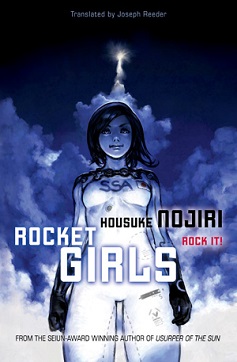
Rocket Girls/Rocket Girls: The Last Planet
Hōsuke Nojiri
214/250 pages
published in 1995/1996
Morita Yukari came to the Solomons Islands to look for her long lost father, who disappeared on his honeymoon seventeen years ago, leaving behind her pregnant mother when he went out on a walk to look at the moon. She has little hope of finding him, but feels she has to try after hearing rumours of a Japanese enclave on one of the islands, which led her to Maltide. What she doesn’t know is that the enclave is the Solomon Space Association which is attempting to create a manned rocket capability but having little success with their new booster which keeps going kaboom. So they decide to go back to their older design, but that has less weight lifting capacity so the race is on to shave off as much weight as possible, including from the astronaut. Who promptly flees. Various things happens, Yukari gets caught up in it and when the SSA director sees her, he has the bright idea to turn her into an astronaut — no weight loss needed for a high school girl weighting only fifty kilos.
Rocket Girls and its sequel rocket Girls: The Last Planet are what you get when you re-imagine your typical Analog space advocacy hard science fiction story as an anime-style comedy. Yukari is the only sane woman in a world full of fanatics and space obsessed loons who see no problem with basically blackmailing a high school girl into becoming their astronaut. The director promises that in return for her becoming an astronaut, he’ll put the SSA’s resources to work to search for Yukari’s father, but it turns out he knew where he was all along.
Most of the first novel is about Yukari being forced to come to terms with her new career, as she settles down in the routine of being an astronaut prospect. Endless medical tests, followed by endless training in astronaviagtion and orbital mechanics, followed by a healthy dose of physical training, including high g centrifugal training set by a slightly sadistic instructor. Adding to her misery is the prospect of her space suit. For the same weight saving reasons as why she was chosen as an astronaut in the first place, it’s not the bulky NASA style suit familiar from e.g. the Moon landings, but a rather skintight number that leaves little to the imagination and is therefore highly embarassing.
Things kick into gear when during the obligatory jungle survival mission, she stumbles over the village of a native tribe and not only discovers her long lost father but also her …sister? The same age as Yukari, Matsuri is quickly drafted into the space programme as a backup astronaut. She turns out to have a natural aptitude for it, which leads to a bit of competition between the sisters, mostly one sided on Yukari’s side. But it’s mainly thanks to Matsuri that she learns to not only accept, but get actively engaged as an astronaut. Increasingly, they’re each other’s strength, which is necessary considering how monomanically focused if not completely useless all the adults are in the story.
Which is indeed the biggest hurdle to overcome in enjoying Rocket Girls, as I can’t help but feel Yukari got shafted hard and good by all the adult authority figures in the story, from the space programme’s director who dragged her into it in the first place, to her father and mother who each insist that since she choose this, she has an obligation to see it true. A very Japanese attitude, seen in countless anime series, but when it’s presented as raw as here, it kind of sticks in the craw.
Things get better in the second half and especially the sequel, when the focus changes from Yukari coming to terms with her new career to the technical challenges in first proving the idea that school girls can indeed make proper astronauts, then following her and Matsumi on their missions once they’ve done so. She’s still the butt of most of the universe’s jokes, frex having to make a crashlanding in her former school’s pond not once, but twice, but it’s not so blatantly unfair as the buildup was.
Technology wise this is very much a product of the mid-nineties, taking place in what’s roughly “the present”: the Mir space station is still around, there are no cell phones or internet, etc. And while the plot is absurd, the rocket science at the heart of it is solidly Analogian, though thankfully without the dreary lectures or politics an analog writer would’ve put it in. The most sfnal things in the whole story are probably the skinsuits and the idea of high school girls flying rockets.
Rocket Girls is a vast, entertaining story as long as you can get over the setup. The translation is good enough that for the most part you don’t realise you are reading one. For those curious, it was made into an anime series that again is quite enjoyable, again if you can get over the setup.
No Comments